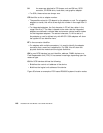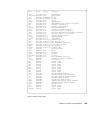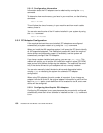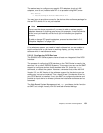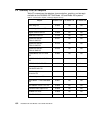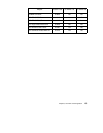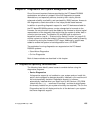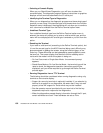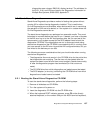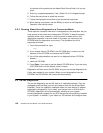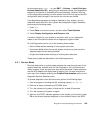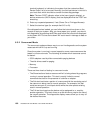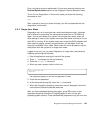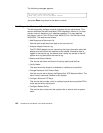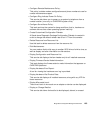156 RS/6000 43P 7043 Models 150 and 260 Handbook
• Selecting a Console Display
When you run Stand-Alone Diagnostics, you will have to select the
console display. The diagnostic program displays instructions on graphics
displays and on terminals attached to the S1 serial port.
• Identifying the Terminal Type to Diagnostics
When you run diagnostics, the diagnostic program must know what type of
terminal you are using. If the terminal type is not known when the Function
Selection menu is displayed, the diagnostics will not allow you to continue
until a terminal is selected from the Define Terminal option menu.
• Undefined Terminal Type
If an undefined terminal type from the Define Terminal option menu is
entered, the menu will prompt you to enter a valid terminal type, and the
menu will be re-displayed until a valid type is entered or you exit from the
option.
• Resetting the Terminal
If you enter a valid terminal (according to the Define Terminal option), but
it is not the correct type for the ASCII terminal being used, difficulty may
be encountered in reading the screen, using the functions keys, or the
Enter key. These difficulties can be bypassed by pressing Ctl-c to reset
the terminal. The screen display that results from this resetting action
varies with the mode in which the system is being run:
• On-line Concurrent or Single-User Mode - the command prompt
appears
• Stand-Alone Mode or On-line Service Mode - the terminal type will be
reset to dumb, the diagnostics operation instruction panel will be
displayed, and you will be required to go through the Define Terminal
process again
• Running Diagnostics from a TTY Terminal
The following should be considered when running diagnostics using a tty
terminal as the console display:
• Support for some tty terminals is optionally installed. If you attach a tty
terminal to a system to run diagnostics, be aware that it may not work
properly since AIX support for the terminal may not be installed.
• See the operator manual provided with your terminal to find the key
sequences required to respond to the diagnostics.
• When the diagnostics present display information through the S1 port,
certain attributes are used. These attributes are set as if the



